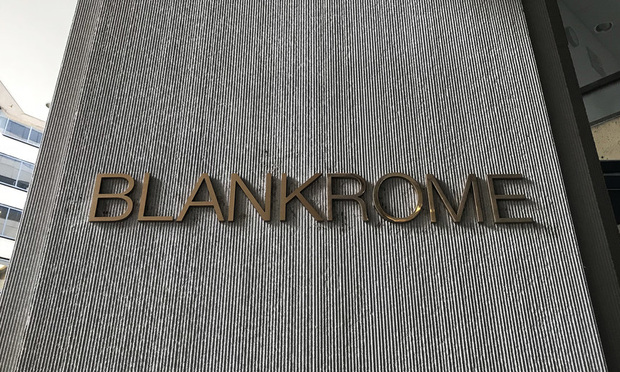Blank Rome Facing Trial for $33M Legal Malpractice Claim
Lawyers for Kristina Armstrong are seeking $33 million in damages against Blank Rome, arguing the firm failed to disclose its ties to her ex-husband's employer, Morgan Stanley.
October 19, 2018 at 04:39 PM
5 minute read
The original version of this story was published on New York Law Journal
 Blank Rome offices in Washington, D.C. (Photo: Diego M. Radzinschi/ALM)
Blank Rome offices in Washington, D.C. (Photo: Diego M. Radzinschi/ALM)
A $33 million legal malpractice and attorney deceit case against Blank Rome is teed up for trial, after a New York judge denied the law firm's latest bid to dismiss the case.
The judge's decision this week on Blank Rome's summary judgment motion is the latest development in the long-running case stemming from the law firm's former representation of Kristina Armstrong, the wife of a bank executive, in a divorce.
Armstrong claims the firm never told her it was also representing her husband's employer, Morgan Stanley, in lucrative transactions—even when the husband was on the company's management committee—and the firm did not act in her best interests during the divorce.
Manhattan Supreme Court Justice David B.Cohen, in a decision posted Wednesday, said Blank Rome failed to demonstrate that Armstrong's claims under Judiciary Law Section 487, claiming attorney deceit, have no merit. He also said the parties' conflicting evidence on the legal malpractice claim raises “issues of fact.”
Now Armstrong and her attorneys are asking for a trial date. When asked about the possibility of settlement, Armstrong's lawyer, Jonathan Sack of Sack & Sack, said in an interview that the defense's settlement proposals, after a court-ordered mediation, have been “insulting.” He added, “I'm looking to try the case. I think they need to be exposed for exactly what they did.”
Sack said Cohen's decision “speaks to the potency and the level of proof” his client has.
The law firm's attorney in the malpractice case, Philip Touitou, a partner of Hinshaw & Culbertson, and a spokeswoman for Blank Rome did not immediately return messages seeking comment Friday about whether they would appeal. Blank Rome unsuccessfully appealed a 2014 decision from Justice Anil Singh denying a motion to dismiss.
The case stems from Armstrong's 2009 divorce petition against her then-husband, Michael Armstrong. Years earlier, Michael Armstrong had become global head of Morgan Stanley's private wealth management department and a member of its management committee.
Shortly after filing for divorce, she retained Norman Heller and Dylan Mitchell, partners of Blank Rome. The following year, she signed a stipulation in which she waived her right to have her husband's securities licenses valued.
In May 2010, she and her husband entered into a written settlement agreement in which she received about $9.1 million, according to Cohen's decision. (Armstrong's ex-husband now leads Royal Bank of Canada's wealth management division in the U.S.)
In her 2013 legal malpractice lawsuit against Blank Rome, Kristina Armstrong claimed the law firm never informed her that the securities license her husband earned during their marriage had boosted his earning capacity, meaning she could have received more from him in the divorce.
Armstrong alleged the firm concealed the value of the enhanced earning capacity and deceived her into waiving her right to value the license because Blank Rome was operating under an undisclosed conflict of interest. She said that, at the time she retained the law firm to represent her in the matrimonial action, Blank Rome was simultaneously representing the husband's employer, Morgan Stanley, in various matters.
The firm never informed her that Blank Rome represented Morgan Stanley in matters dating to 1982, even though, when she retained the firm, her husband sat on Morgan Stanley's management committee. She pointed to Blank Rome's representation of Morgan Stanley in a $400 million public finance matter and argued Blank Rome was more interested in protecting the husband and its relationship with Morgan Stanley than being a zealous advocate for her. She's claiming about $33 million in damages.
In response the malpractice suit, Blank Rome counterclaimed for about $99,000 in unpaid legal fees, plus interest.
According to Cohen's decision, Blank Rome argued that its failure to inform Armstrong that the firm represented the husband's employer, Morgan Stanley, does not constitute malpractice. The firm said there was no conflict of interest, because the underlying matrimonial action was entirely unrelated to any matters in which it represented Morgan Stanley. The firm also contended that Morgan Stanley was not a multimillion-dollar client, and in 2009 and 2010 the bank accounted for less than 0.2 percent of the firm's gross income.
Blank Rome argued that the bank's management committee did not control the assignment of legal work to law firms, and the husband had no knowledge of Blank Rome's existence until the firm was initially retained to represent the wife in the divorce.
In his Wednesday decision, Cohen said the parties' conflicting affidavits, deposition testimony and expert opinions “raise issues of fact as to whether [Blank Rome and its lawyers] acted under an undisclosed conflict of interest, and, as a result, their professional judgment was impaired causing them not to seek a valuation” of the enhanced earning capacity and to pressure the wife to waive her right to a valuation without sufficient explanation.
“The competing expert affidavits also raise issues of fact as to whether plaintiff suffered damages as a result,” the judge said.
The ruling found that Armstrong's Section 487 claim—which allows a plaintiff to recover treble damages for attorney deceit on any party or the court—was not duplicative of the malpractice claim. Blank Rome “failed to demonstrate” that Armstrong's attorney deceit claim had no merit, Cohen said.
While Blank Rome submitted affidavits denying that its decisions were influenced by a conflict of interest and that it did not intend to deceive Armstrong, Blank Rome's “assertions are insufficient to warrant judgment” in its favor, the judge said, adding “they merely raise an issue of fact.”
This content has been archived. It is available through our partners, LexisNexis® and Bloomberg Law.
To view this content, please continue to their sites.
Not a Lexis Subscriber?
Subscribe Now
Not a Bloomberg Law Subscriber?
Subscribe Now
NOT FOR REPRINT
© 2025 ALM Global, LLC, All Rights Reserved. Request academic re-use from www.copyright.com. All other uses, submit a request to [email protected]. For more information visit Asset & Logo Licensing.
You Might Like
View All
Litigators of the Week: The Eighth Circuit Knocks Out a $564M Verdict Against BMO in Ponzi Case

Litigators of the Week: Second Circuit Tells Argentina to Turn Over More Than $300M to Bondholders

How One of the World's Largest Institutional Investors Approaches Litigation

Big Law and Litigation Finance Seem to Be Having a Moment
Trending Stories
- 1Thompson Coe, 2 Lawyers, Hit by $1M+ Legal Mal Suit
- 2Regulatory Intelligence Platform Abstract Announces $4.8 Million in Seed Funding
- 3Former Sacks Weston Partner Faces 5-Year Suspension Over Mail, Wire Fraud Conviction
- 47th Circ. Revives Transactional Dispute Against Military Retailer, Sends to State Court
- 5Lavish 'Lies' Led to Investors Being Fleeced in Nine-Figure International Crypto Scam
Who Got The Work
Michael G. Bongiorno, Andrew Scott Dulberg and Elizabeth E. Driscoll from Wilmer Cutler Pickering Hale and Dorr have stepped in to represent Symbotic Inc., an A.I.-enabled technology platform that focuses on increasing supply chain efficiency, and other defendants in a pending shareholder derivative lawsuit. The case, filed Oct. 2 in Massachusetts District Court by the Brown Law Firm on behalf of Stephen Austen, accuses certain officers and directors of misleading investors in regard to Symbotic's potential for margin growth by failing to disclose that the company was not equipped to timely deploy its systems or manage expenses through project delays. The case, assigned to U.S. District Judge Nathaniel M. Gorton, is 1:24-cv-12522, Austen v. Cohen et al.
Who Got The Work
Edmund Polubinski and Marie Killmond of Davis Polk & Wardwell have entered appearances for data platform software development company MongoDB and other defendants in a pending shareholder derivative lawsuit. The action, filed Oct. 7 in New York Southern District Court by the Brown Law Firm, accuses the company's directors and/or officers of falsely expressing confidence in the company’s restructuring of its sales incentive plan and downplaying the severity of decreases in its upfront commitments. The case is 1:24-cv-07594, Roy v. Ittycheria et al.
Who Got The Work
Amy O. Bruchs and Kurt F. Ellison of Michael Best & Friedrich have entered appearances for Epic Systems Corp. in a pending employment discrimination lawsuit. The suit was filed Sept. 7 in Wisconsin Western District Court by Levine Eisberner LLC and Siri & Glimstad on behalf of a project manager who claims that he was wrongfully terminated after applying for a religious exemption to the defendant's COVID-19 vaccine mandate. The case, assigned to U.S. Magistrate Judge Anita Marie Boor, is 3:24-cv-00630, Secker, Nathan v. Epic Systems Corporation.
Who Got The Work
David X. Sullivan, Thomas J. Finn and Gregory A. Hall from McCarter & English have entered appearances for Sunrun Installation Services in a pending civil rights lawsuit. The complaint was filed Sept. 4 in Connecticut District Court by attorney Robert M. Berke on behalf of former employee George Edward Steins, who was arrested and charged with employing an unregistered home improvement salesperson. The complaint alleges that had Sunrun informed the Connecticut Department of Consumer Protection that the plaintiff's employment had ended in 2017 and that he no longer held Sunrun's home improvement contractor license, he would not have been hit with charges, which were dismissed in May 2024. The case, assigned to U.S. District Judge Jeffrey A. Meyer, is 3:24-cv-01423, Steins v. Sunrun, Inc. et al.
Who Got The Work
Greenberg Traurig shareholder Joshua L. Raskin has entered an appearance for boohoo.com UK Ltd. in a pending patent infringement lawsuit. The suit, filed Sept. 3 in Texas Eastern District Court by Rozier Hardt McDonough on behalf of Alto Dynamics, asserts five patents related to an online shopping platform. The case, assigned to U.S. District Judge Rodney Gilstrap, is 2:24-cv-00719, Alto Dynamics, LLC v. boohoo.com UK Limited.
Featured Firms
Law Offices of Gary Martin Hays & Associates, P.C.
(470) 294-1674
Law Offices of Mark E. Salomone
(857) 444-6468
Smith & Hassler
(713) 739-1250






